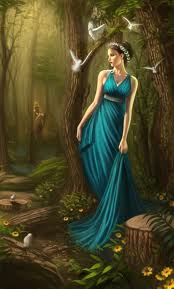Ode to Psyche
Ode to psyche is a poem which expresses
the beauty of Psyche from the perspective of a worshipper of beauty Keats. First
the poet has expressed the beauty of psyche and then he worships her because
she was a neglected goddess. It is connected with the myth of psyche.
O
Goddess! hear these tuneless numbers, wrung
By sweet
enforcement and remembrance dear,
And
pardon that thy secrets should be sung
Even into
thine own soft-conched ear:
Surely I
dreamt to-day, or did I see
The
winged Psyche with awaken'd eyes?
I
wander'd in a forest thoughtlessly,
And, on
the sudden, fainting with surprise,
Saw two
fair creatures, couched side by side
In
deepest grass, beneath the whisp'ring roof
Of leaves
and trembled blossoms, where there ran
A
brooklet, scarce espied:
In the very first stanza poet addresses Psyche
as a goddess. Then he apologises because he is going to expose all the secrets
of Psyche’s life and her story. He stars the story by telling that he was wandering
in the forest and he saw two lovers together making love in nature. He recognized
them as they were Psyche and Cupid.
Mid
hush'd, cool-rooted flowers, fragrant-eyed,
Blue,
silver-white, and budded Tyrian,
They lay
calm-breathing, on the bedded grass;
Their
arms embraced, and their pinions too;
Their
lips touch'd not, but had not bade adieu,
As if
disjoined by soft-handed slumber,
And ready
still past kisses to outnumber
At tender
eye-dawn of aurorean love:
The
winged boy I knew;
But who
wast thou, O happy, happy dove?
His
Psyche true!
In the second stanza there is description
of both lovers after they have loved each other and still both are in the arms
of each other. Then he questions that from two lovers he was aware with the
winged boy but was not aware with the lady with him, and suddenly he recognizes
that she was his Psyche.
O latest
born and loveliest vision far
Of all
Olympus' faded hierarchy!
Fairer
than Phoebe's sapphire-region'd star,
Or
Vesper, amorous glow-worm of the sky;
Fairer
than these, though temple thou hast none,
Nor altar
heap'd with flowers;
Nor
virgin-choir to make delicious moan
Upon the
midnight hours;
No voice,
no lute, no pipe, no incense sweet
From
chain-swung censer teeming;
No
shrine, no grove, no oracle, no heat
Of
pale-mouth'd prophet dreaming.
.
In this stanza, Keats described the
beauty of the Psyche. He says that she is the most beautiful woman in the
world. He used lots of metaphors in his description of her beauty. He also
addresses Psyche as a neglected goddess.
O brightest!
though too late for antique vows,
Too, too
late for the fond believing lyre,
When holy
were the haunted forest boughs,
Holy the
air, the water, and the fire;
Yet even
in these days so far retir'd
From
happy pieties, thy lucent fans,
Fluttering
among the faint Olympians,
I see,
and sing, by my own eyes inspir'd.
So let me
be thy choir, and make a moan
Upon the
midnight hours;
Thy
voice, thy lute, thy pipe, thy incense sweet
From
swinged censer teeming;
Thy
shrine, thy grove, thy oracle, thy heat
Of pale-mouth'd prophet dreaming
In this stanza poet says that like all
other divinities Psyche has no temple no worshipping song and no flowers for
her because she came too late in this world. Though she is the youngest and most beautiful of all the Olympian gods and
goddesses she has no worshippers and temples. Keats addresses himself as prophet
and starts worshipping Psyche.
Yes, I
will be thy priest, and build a fane
In some
untrodden region of my mind,
Where
branched thoughts, new grown with pleasant pain,
Instead
of pines shall murmur in the wind:
Far, far
around shall those dark-cluster'd trees
Fledge
the wild-ridged mountains steep by steep;
And there
by zephyrs, streams, and birds, and bees,
The
moss-lain Dryads shall be lull'd to sleep;
And in
the midst of this wide quietness
A rosy
sanctuary will I dress
With the
wreath'd trellis of a working brain,
With
buds, and bells, and stars without a name,
With all
the gardener Fancy e'er could feign,
Who
breeding flowers, will never breed the same:
And there
shall be for thee all soft delight
That
shadowy thought can win,
A bright
torch, and a casement ope at night,
To let
the warm Love in!
In the final stanza, poet says to psyche
that he will be her priest and his mind will be the temple of her, where the
thoughts of poet stays and it will worship her forever. He wants to become the
choir, the oracles and music for Psyche. He promises Psyche that he will give her all the delights. He will
keep the window of her new temple open at night so her lover can come to meet
her, as he says, “Let the warm Love in”

No comments:
Post a Comment